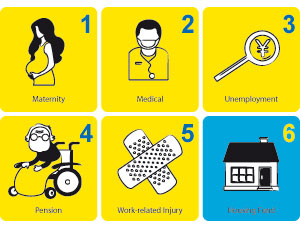Update: Foreigner Participation in China’s Social Insurance Scheme
By Eunice Ku
 Oct. 18 – Since China’s Ministry of Human Resources and Social Security issued measures in September 2011 stating that social insurance contributions should be paid on behalf on foreigners working in China, local policies governing the implementation of the measures have varied considerably.
Oct. 18 – Since China’s Ministry of Human Resources and Social Security issued measures in September 2011 stating that social insurance contributions should be paid on behalf on foreigners working in China, local policies governing the implementation of the measures have varied considerably.
Cities including Dalian, Shenzhen, Beijing, Suzhou, Tianjin and Xiamen have implemented local implementing rules requiring foreign employees to enroll in the social insurance scheme and contribute to some (if not all) of the insurances, while others have yet to implement policies mandating any participation.
Dalian currently requires only pension payments to be made on behalf of foreign employees, while Shenzhen requires employer payment towards four insurances (with foreign individuals paying only pension and medical insurances) and Beijing, Suzhou, Tianjin, and Xiamen require payment of all five insurances.
As of the end of 2011, 7,800 foreigners have begun participating in Beijing’s various social insurances, and as of mid-August 2012, approximately 7,000 foreigners have begun participating in the social insurance system in Jiangsu Province as a whole, according to media reports.
Not all major cities have implemented policies requiring social insurance participation. Shanghai, for example, permits foreign employees working in the city to voluntarily participate in pension, medical and work-related injury insurances. However, from the time of promulgation of this policy (October 2009) until April 2011, fewer than 100 foreigners have begun participating.
When policies mandating participation may be issued in Shanghai and the other remaining cities remains uncertain.
 Portions of this article came from the October 2012 issue of China Briefing Magazine titled, “Social Insurance and Payroll.” In this issue, we take a “back to basics” approach to China’s mandatory benefits. Where, exactly, is that extra 35-40 percent on top of an employee’s salary going? What are social insurance contribution rates, base amounts, and tax exemptions? How does all of this figure into the payroll process? We next look at mandatory benefits as a piece of the larger payroll puzzle, with highlights on two very China-specific pieces: FESCOs and hukou, China’s “domestic passport.”
Portions of this article came from the October 2012 issue of China Briefing Magazine titled, “Social Insurance and Payroll.” In this issue, we take a “back to basics” approach to China’s mandatory benefits. Where, exactly, is that extra 35-40 percent on top of an employee’s salary going? What are social insurance contribution rates, base amounts, and tax exemptions? How does all of this figure into the payroll process? We next look at mandatory benefits as a piece of the larger payroll puzzle, with highlights on two very China-specific pieces: FESCOs and hukou, China’s “domestic passport.”
Dezan Shira & Associates is a specialist foreign direct investment practice, providing corporate establishment, business advisory, tax advisory and compliance, accounting, payroll, due diligence and financial review services to multinationals investing in emerging Asia. Since its establishment in 1992, the firm has grown into one of Asia’s most versatile full-service consultancies with operational offices across China, Hong Kong, India, Singapore and Vietnam as well as liaison offices in Italy and the United States.
For further details or to contact the firm, please email china@dezshira.com, visit www.dezshira.com, or download the company brochure.
You can stay up to date with the latest business and investment trends across China by subscribing to The China Advantage, our complimentary update service featuring news, commentary, guides, and multimedia resources.
Related Reading
 An Introduction to Doing Business in China
An Introduction to Doing Business in China
Asia Briefing, in cooperation with its parent firm Dezan Shira & Associates, has just released this 40-page report introducing everything that a foreign investor should be familiar with when establishing and operating a business in China.
A FESCO as a Tool for Labor Dispatch in China
The Best of Asia Briefing – August/September 2012
Limiting Tax Exposure for American Expatriates in China
China Releases 2011 Statistics for HR and Social Security Development
Shenzhen Adjusts Housing Fund Base and Work-Related Injury Insurance Rates
- Previous Article VAT General Taxpayer Recognition in Non-Pilot Regions
- Next Article Guangzhou Releases Plan for VAT Pilot Collection









